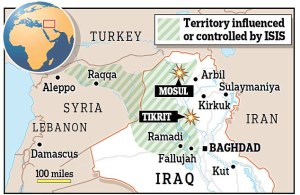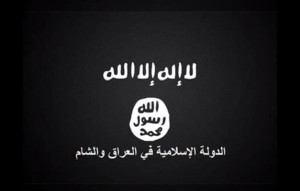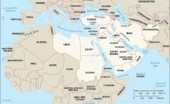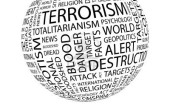Re Ian Bremmer 'Could third-party candidates upend the 2024 US election?' 3 April The current political movement in the USA…
ISIS/ISIL 2013-14
Written by Diana Thebaud Nicholson // December 30, 2014 // Middle East & Arab World, Terrorism // Comments Off on ISIS/ISIL 2013-14
Alastair Crooke: You Can’t Understand ISIS If You Don’t Know the History of Wahhabism in Saudi Arabia
The dramatic arrival of Da’ish (ISIS) on the stage of Iraq has shocked many in the West. Many have been perplexed — and horrified — by its violence and its evident magnetism for Sunni youth. But more than this, they find Saudi Arabia’s ambivalence in the face of this manifestation both troubling and inexplicable, wondering, “Don’t the Saudis understand that ISIS threatens them, too?”
It appears — even now — that Saudi Arabia’s ruling elite is divided. Some applaud that ISIS is fighting Iranian Shiite “fire” with Sunni “fire”; that a new Sunni state is taking shape at the very heart of what they regard as a historical Sunni patrimony; and they are drawn by Da’ish’s strict Salafist ideology.
Other Saudis are more fearful, and recall the history of the revolt against Abd-al Aziz by the Wahhabist Ikhwan (Disclaimer: this Ikhwan has nothing to do with the Muslim Brotherhood Ikhwan — please note, all further references hereafter are to the Wahhabist Ikhwan, and not to the Muslim Brotherhood Ikhwan), but which nearly imploded Wahhabism and the al-Saud in the late 1920s.
Many Saudis are deeply disturbed by the radical doctrines of Da’ish (ISIS) — and are beginning to question some aspects of Saudi Arabia’s direction and discourse.
THE SAUDI DUALITY
Saudi Arabia’s internal discord and tensions over ISIS can only be understood by grasping the inherent (and persisting) duality that lies at the core of the Kingdom’s doctrinal makeup and its historical origins.
One dominant strand to the Saudi identity pertains directly to Muhammad ibn ʿAbd al-Wahhab (the founder of Wahhabism), and the use to which his radical, exclusionist puritanism was put by Ibn Saud. (The latter was then no more than a minor leader — amongst many — of continually sparring and raiding Bedouin tribes in the baking and desperately poor deserts of the Nejd.)
The second strand to this perplexing duality, relates precisely to King Abd-al Aziz’s subsequent shift towards statehood in the 1920s: his curbing of Ikhwani violence (in order to have diplomatic standing as a nation-state with Britain and America); his institutionalization of the original Wahhabist impulse — and the subsequent seizing of the opportunely surging petrodollar spigot in the 1970s, to channel the volatile Ikhwani current away from home towards export — by diffusing a cultural revolution, rather than violent revolution throughout the Muslim world. (27 August 2014)
29 December
Iraq’s Sunnis may seek Iran help against ISIL
Desperate for arms and military training to fight ISIL, Sunni tribes were considering Iranian assistance as an option
Iraqi Sunni tribal sheikhs threatened to resort to the United States’ rival in the region, the Islamic Republic of Iran, to get the needed military support in their fight against the Islamic State of Iraq and the Levant (ISIL), if the US did not respond to their demands, warned Iraqi lawmakers and tribal sheikhs. The crisis in Iraq: Was the rise of ISIL a surprise?–– The legacy of Saddam Hussein’s Baathist regime facilitated the success of ISIL in Iraq.
ISIL ‘killed foreign fighters in its ranks’
Syrian monitoring organisation says group killed 1,175 civilians and 116 foreign fighters who wished to return home.
14 December
Iran advisers boost anti-ISIL battles in Iraq
Security officials say advisers from Iran have played a key role in Iraq’s recent victories against ISIL fighters.
Iran was the first country to respond to the Iraqi government’s calls for international help in the battle against ISIL, which overran vast swaths of the country’s north and west this summer and were advancing towards the capital.
Dozens of Iranian military commanders – including Qassim Sulaimani, the head of Iran’s elite Quds Force – have joined Iraqi security forces in battlefields north and south of Baghdad. Iraqi troops, backed by Shia militias, Kurdish forces and Iranian military commanders, recently regained control of the towns of Jalawla and Saadia in Diyala province.
4 December
ISIS Enters Egypt — How Washington Must Respond
(Foreign Affairs) The Islamic State of Iraq and al-Sham (ISIS) has officially entered Egypt. On November 10, Ansar Beit al-Maqdis, a militant movement that operates out of the northern Sinai Peninsula, pledged allegiance to ISIS and its leader, Abu Bakr al-Baghdadi. The group, which emerged after the 2011 uprising that overthrew Egyptian President Hosni Mubarak, has already established itself as a formidable player in its own right. In recent months, it has staged devastating attacks on Egypt’s police forces and claimed responsibility for a series of suicide attacks on military facilities in Cairo and the Sinai Peninsula.
The announcement was not a complete surprise, however, coming just weeks after Egyptian President Abel Fattah al-Sisi declared a state of emergency in the Sinai Peninsula and launched a bloody offensive against the group, which required an evacuation of Rafah that displaced approximately 10,000 people. Moreover, Ansar Beit al-Maqdis and ISIS are natural partners: They share not only a radical ideology but also barbaric tactics.
30 October
This Might Be The Most Horrific Single Massacre ISIS Has Committed
Islamic State militants drove 600 Shia, Christian, and Yazidi male prisoners into the middle of the desert, lined them up along the edge of a ravine, and executed them at point blank range, according to a report by Human Rights Watch released Thursday.
26 October
What Islamic State hostages endured before beheadings
(NYT news service via Globe & Mail) The story of what happened in the Islamic State’s underground network of prisons in Syria is one of excruciating suffering. Foley and his fellow hostages were routinely beaten and subjected to waterboarding. For months, they were starved and threatened with execution. The prisoners banded together, playing games to pass the endless hours, but as conditions grew more desperate, they turned on one another. Some, including Foley, sought comfort in the faith of their captors, embracing Islam and taking Muslim names.
… By the second year of Foley’s imprisonment, the group had amassed close to two dozen hostages and devised a strategy to trade them for cash.
It was at that point that the hostages’ journeys, which had been largely similar up to then, diverged based on actions taken thousands of miles away: in Washington and Paris, in Madrid, Rome and beyond. Foley was one of at least 23 Western hostages from 12 countries, a majority of them citizens of European nations whose governments have a history of paying ransoms.
Their struggle for survival, which is being told now for the first time, was pieced together through interviews with five former hostages, locals who witnessed their treatment, relatives and colleagues of the captives, and advisers who made trips to the region to try to win their release. Details were confirmed by a former member of Islamic State who was stationed in the prison where Foley was held.
16 October
The Islamic State (IS) militant group has been driven out of most of the northern Syrian town of Kobane, a Kurdish commander has told the BBC.
Baharin Kandal said IS fighters had retreated from all areas, except for two pockets of resistance in the east.
US-led air strikes have helped push back the militants, with another 14 conducted over the past 24 hours.
Chemical arms in ISIS territory in Iraq spark fear
(Al Arabiya) With a recent report revealing that the U.S. government had tried to hide the extent to which its troops were exposed to chemical weapons in the aftermath of the 2003 invasion of Iraq, fears are mounting that extremist militants could possibly use the antiquated arms which are reportedly stored in ISIS-held territories in Iraq.
Gary Brecher — The War Nerd: Nobody could have predicted Islamic State’s retreat from Kobane (except me)
… sometimes—very rarely, actually—people who’ve been pushed into war against their will come out of it as something more than the rest of us. Kobane was just another dusty town when Syria blew up a few years ago. No one in Kobane was strutting around trying to be a hero, which is more than you can say about the Ali-Jihadis in IS. All the Kurds of Kobane were trying to do was keep their town alive. And, to everyone’s surprise—and most of the big players’ annoyance—they succeeded. It’s the rarest thing in the world, a truly heroic story.
There are three major reasons for the non-fall of Kobane. I’ll try to explain them quickly here.
1. Because Islamic State is a lousy, overrated fighting force.
2. The U.S. finally got so embarrassed by the Kurds’ heroic defense that it had to get serious.
3. Because the YPG/J wouldn’t let it.
14 October
 Michael Knights: Why the Islamic State Is Losing
Michael Knights: Why the Islamic State Is Losing
The pundits have it wrong—the terrorists’ move toward Baghdad is a sign of desperation
(Politico) In truth, the threat posed to Baghdad this autumn is emerging less because ISIL is winning the war in Iraq and more because it might be slowly but steadily losing it. All across north-central Iraq, ISIL is being challenged by joint forces comprised of Sunni tribes, Shia militias, Iraqi soldiers, Iranian advisors and U.S. airpower. ISIL is struggling to maintain its grip on this battlefield of strange bedfellows, and it could be moving on Baghdad now out of a desperate need for a big victory more than anything else. Even as ISIL appears to be making progress in marginal places like Kobane, the Syrian Kurdish border town, inside Iraq the group has been faltering and needs a new front to rejuvenate its campaign.
… most likely, ISIL is simply readying for its annual killing spree against Shia pilgrims during the Ashura and Arbaeen religious festivals. In the week before Ashura begins on Nov. 3, Baghdad will swell with millions of pilgrims making their way to Karbala, just southwest of the capital. Many of these pilgrims make the 50-mile walk from Baghdad to Karbala, which passes within seven miles of Jurf as-Sakr, a heavily-contested ISIL stronghold to the south of Baghdad. We can expect mortar attacks, car bombings and suicide-vest detonations inside the crowds.
This is the real meaning of ISIL being at the gates of Baghdad – that the movement is poised perilously close to key religious and transportation hubs, and may be intent on mounting sectarian outrages at the most sensitive moment of the year for the Shia. The Iraqi security forces view Ashura and Arbaeen as an annual trial – and in recent years they have achieved significant success in limiting the mayhem caused by ISIL and its forerunners.
This year the Iraqi military and allied Shia militias have been fighting hard, with U.S. air support, to clear ISIL back from the pilgrim routes between Baghdad and Karbala – and with some success. Protecting the pilgrims and blunting ISIL’s gambits in Baghdad will be the next great test for Iraq’s recovering security forces – because the enemy is truly at the gates of the Shia world.
4 October
US: Militants use beheadings to make up for losses
Within days of a military defeat, the group would release images of more beheadings — at least nine over six weeks — of Western journalists, aid workers and Muslim soldiers.
The tactic signals that even as the Islamic State group suffers battlefield losses, it is holding on to its edge in the propaganda war. U.S. officials say that’s the only way the militants can continue to maintain support and attract new recruits.
Tales of torture, mutilation and rape as Isis targets key town of Kobani
Turkey orders troops to border but refuses to intervene to repel brutal jihadist advance as refugees report atrocities
2 October
10 Ways ISIS Is Violating The Laws Of Islam
Islamic scholars and Muslim leaders around the world have come together to condemn ISIS and its leader Abu Bakr al-Baghdadi, issuing a letter accusing Baghdadi of failing to respect key tenants of the Islam.
The letter, signed by 126 Muslims, offers an academic rebuke of Baghdadi’s interpretation of Islam, which the leader has claimed is the basis for founding an Islamic State in Iraq and Syria.
That letter outlines 24 violations of Islamic Law, noting it’s forbidden to kill the innocent, torture people, and disfigure the dead. ISIS beheaded US journalist James Foley as well as a British aid worker named Allan Henning, clear violations of the tenets outlined in the letter.
The letter comes after a significant backlash to ISIS among the world’s 1.6 billion Muslims. Around the world, Muslims have responded to the slick social media recruitment campaign by ISIS with their own social media endeavors, with many rallying behind the hashtag #NotInMyName. (Business Insider)
Inside ISIS: Sex slaves, child fighters, mass executions
Islamic State insurgents carried out mass executions, sold women into sex slavery and recruited child fighters, according to a United Nations report that paints a grim picture of the extremist group.
A 40-page report published by the UN on Tuesday details human rights abuses that occurred between July 6 and Sept. 10.
29 September
The many names of ISIS (also known as IS, ISIL, SIC and Da’ish) – (The Economist explains) Part of the trouble is that the group has evolved over time, changing its own name. It started as a small but viciously effective part of the Sunni resistance to America’s 2003 invasion of Iraq that called itself al-Qaeda in Iraq, or AQI. In 2007, following the death of its founder (and criticism from al-Qaeda for being too bloodthirsty), AQI rebranded itself the Islamic State in Iraq, or ISI. This group suffered setbacks on its home turf, but as Syria descended into civil war in 2011 it spotted an opportunity. By 2013 it had inserted itself into eastern Syria and adopted a new name to match, the Islamic State in Iraq and Syria (ISIS). Increasing the confusion, ISIS changed its name yet again in June this year, declaring itself the State of the Islamic Caliphate (SIC), a title that reflects its ambitions to rule over Muslims everywhere.
Translation presents another problem. In its next-to-most-recent incarnation, as ISIS, the group sought to challenge “colonialist” borders by using an old Arab geographical term—al-Sham—that applies either to the Syrian capital, Damascus, or to the wider region of the Levant; hence the official American preference for calling it Islamic State of Iraq and the Levant, or ISIL, rather than ISIS. The Arabic for this, al-Dawla al-Islamiya fil ’Iraq wal-Sham, can be abbreviated to Da’ish, just as the Palestinian group Hamas (which means “Zeal”) is an acronym for Harakat al-Muqawama al-Islamiya, or Islamic Resistance Movement. Da’ish is the name that has widely stuck among Arabs, although the group’s own members call it simply the State, al-Dawla, for short, and threaten with lashes those who use Da’ish.

Who are Isis? A terror group too extreme even for al-Qaida
The Islamic State in Iraq and the Levant has a reputation for being even more brutal than the main jihadi group of inspiration
It runs courts, schools and services, flying its black-and-white flag over every facility it controls. In Raqqa, it even started a consumer protection authority for food standards.
Isis has bolstered its strength by recruiting thousands of foreign volunteers in Syria, some from Europe and the US, and is estimated to have more than 10,000 men under its control.(11 June)
23 September
Foreign Policy reports: The United States and Arab allies struck Islamic State targets inside Syria late Monday night, hitting bases, checkpoints, and training camps in a broad series of airstrikes. The strikes, which were supported by Jordan, Qatar, Saudi Arabia, and the United Arab Emirates, were a bold — and potentially risky — expansion of the campaign against the terrorist group, which has so far been restrained to Iraq despite the group operating across the porous border between the two countries. This opening salvo in the new front reportedly included fighter jets, drones, and cruise missiles hitting 14 Islamic State targets in Syria, as well as separate strikes against the Khorasan and al-Nusra terrorist organizations, and four strikes in Iraq.
20 September
Kurdish fighters enter Syria from Turkey to counter advance by Islamic State group
Hundreds of Kurdish fighters have crossed from Turkey into neighbouring Syria to defend a Kurdish area under attack by Islamic State militants, activists said Saturday. Fighting there led another prominent Kurdish official to appeal for international assistance in their battle against the extremists.
The movement of hundreds of Kurdish fighters into Syria reflected the ferocity of the fighting in the northern Kobani area, which borders Turkey. Militants of the extremist Islamic State group have been barrelling through the area over the past three days, seizing villages and forcing tens of thousands of Syrian Kurds to flee.
“Kobani is facing the fiercest and most barbaric attack in its history,” said official Mohammed Saleh Muslim, head of Syria’s powerful Kurdish Democratic Union. The groups’ members dominate the Syrian Kurdish group known as the YPK, which is fighting the Islamic State militants.
18 September
ISIS’s Call of Duty
(New Yorker) The similarities between ISIS recruitment films and first-person-shooter games are likely intentional. Back in June, an ISIS fighter told the BBC that his new life was “better than that game Call of Duty.” Video-game-themed memes traced back to ISIS have been floating around the Internet for months, including one that reads, “THIS IS OUR CALL OF DUTY AND WE RESPAWN IN JANNAH.” (“Respawn” is the gamer word for reincarnate.) Another ISIS video, as the Intercept notes, looks like a deliberate homage to Grand Theft Auto. Audio clips that sound much like ones in Call of Duty have been spliced into other ISIS videos. Many of the ISIS recruitment videos are dedicated to showcasing rocket launchers, mines, and assault rifles, as if to say, “If you join us, you’ll get to shoot these things.”
16 September
World briefing on US-led coalition to defeat Isis in Iraq and Syria
(The Guardian) The US and its allies plan to ‘degrade and destroy’ Islamic State through air strikes in Iraq and Syria with the endorsement of almost 40 countries. 22 August
Britain hunts for man with English accent in beheading video
UN: 700,000 Iraqis have found haven in Kurdish area
UNHCR steps up massive aid operation to the region
17 August
BBC reports that Kurdish forces ‘break IS hold on Mosul dam’ — Kurdish forces in northern Iraq are in near complete control of Iraq’s largest dam after ousting Islamic State (IS) militants, Kurdish officials say.
15 August
Iraq crisis: Arming Kurds on EU agenda in Brussels
(BBC) EU foreign ministers are holding an emergency meeting in Brussels on Friday to discuss plans to arm Iraq’s Kurds against an extremist insurgency.
France and the US have already begun to supply weapons to the Kurds, whose Peshmerga fighters are trying to halt an advance by Islamic State militants.
On Thursday, Iraqi Prime Minister Nouri Maliki resigned and conceded power to Haider al-Abadi, Iraq’s deputy speaker.
Meanwhile, the governor of Dohuk province has warned of a “genocide”. “We have hundreds of thousands (of refugees). We’re going to face an international humanitarian catastrophe because many of these kids and children will die,” said Farhad Atrushi.The militants’ huge territorial gains and the murders of three hostages have galvanised efforts for an international coalition to defeat the radical group
8 August
The U.S. had to intervene in Iraq because ISIS’s goals are absolutely terrifying.
(Slate) The Islamic State of Iraq and Syria steals with the best of them, and I don’t doubt that some of the fighters who’ve attached themselves to its cause are thrill-seeking psychopaths like those you’ll find in any lawless hellhole. On the whole, however, you get the impression that its fighters aren’t killing for fun and profit, and they’re certainly not killing to protect themselves from other crazies. Instead, they are killing because they are utopians. They want to live in a world that is quite literally cleansed of those who do not share their deranged beliefs, and by killing Yazidis and Christians and members of other religious minorities, they believe that they are serving a noble and just cause. The Taliban are awful, but given their willingness to cut deals with the Afghan government and the United States and its allies, they aren’t quite so insane. Even al-Qaida is more tolerant of religious minorities than the lunatics of ISIS. Now, with hundreds of millions of dollars worth of stolen loot, ISIS is on the march, closing in on stranded pockets of women and men they see as pagans and slowly starving them to death. The Kurdish peshmerga, the only Iraqi fighting force capable of holding ISIS at bay, has put up a brave resistance, yet they are starting to buckle.
Britain unveils UN containment strategy for the Islamic State
(Foreign Policy) Britain hopes a diplomatic initiative it introduced in the U.N. Security Council on Friday will contain Islamic extremists in Iraq and Syria by curtailing their fundraising. The plan is to quash their illicit oil and gold exports, prevent ransom kidnappings, and hobble recruitment to stymie the establishment of an Islamic caliphate straddling the two Middle Eastern countries.
7 August
The Iraqi Minorities in ISIS’s Crosshairs
Communities face existential danger as the Islamic State marches on.
(The Atlantic) “In one day, they killed more than two thousand Yazidi in Sinjar, and the whole world says, ‘Save Gaza, save Gaza.’”
The poignant lament of an Iraqi named Karim, quoted in The New Yorker, captures the helpless frustration of many minorities facing existential danger in areas controlled by ISIS, the terrorist group, while much of the world has been transfixed by the war between Israel and Hamas. While both Israelis and Palestinians have carelessly bandied about the word “genocide,” it is a real threat for the communities in ISIS’s crosshairs.
6 August
A Friend Flees the Horror of ISIS
(The New Yorker) A humanitarian crisis that could turn into a genocide is taking place right now in the mountains of northwestern Iraq. It hasn’t made the front page, because the place and the people are obscure, and there’s a lot of other horrible news to compete with.
Sinjar is a historic Yazidi area with an Arab minority. Depending on who’s drawing the map, Sinjar belongs to either the northernmost part of Iraq or the westernmost part of Kurdistan. Since June, when extremist fighters from the Islamic State in Iraq and al-Sham captured Mosul, they’ve been on the outskirts of Sinjar, facing off against a small number of Kurdish peshmerga militiamen. ISIS regards Yazidis as devil worshippers, and its fighters have been executing Yazidi men who won’t convert to Islam on the spot, taking away the women as jihadi brides.
25 July
IS tightens its sectarian rule as Iraq taps new president
Fouad Massoum was elected as Iraq’s president while the jihadi group the Islamic State destroyed Christian shrines and imposed Islamic dress on women in the country’s north.
(CSM) Fouad Massoum, a veteran Kurdish politician, was elected to replace President Jalal Talabani, also a Kurd. The presidential post is largely a symbolic one, Reuters notes, but putting someone in place is an example of the kind of consensus that has been in short supply since the April parliamentary election. The election could be a step toward a greater US military role in Iraq.
Iraq jihadists blow up ‘Jonah’s tomb’ in Mosul
Islamic State insurgents destroy reputed burial site of a prophet known in the Bible as Jonah after storming Iraqi city
24 July
The Islamic State Isn’t Circumcising Women and Didn’t Steal $400 Million Either
(Foreign Policy) Since the Islamic State captured Mosul last month, it has burned shops selling alcohol, ordered veils placed over the faces of mannequins in store windows, and implemented discriminatory policies that forced the majority of the city’s Christians to flee. You’d think that was dramatic enough — but a number of apparently false stories about the jihadist group’s behavior in Iraq’s second-largest city are spreading like wildfire through the Western media.
The latest culprit appears to be U.N. official Jacqueline Badcock, who told reporters on Thursday that the Islamic State had issued a fatwa ordering women to undergo female genital mutilation (FGM). The procedure is quite rare in Iraq — it is far more common in sub-Saharan Africa — and is not typically something that jihadists demand. As Agence France-Presse reported, instituting FGM in areas under the control of the Islamic State, which was previously known as the Islamic State of Iraq and al-Sham, or ISIS, could place 4 million women and girls at risk of undergoing the procedure.
Thankfully, Badcock’s claim has been widely debunked by reporters and analysts. NPR’s Cairo bureau chief, Leila Fadel, reported that residents of Mosul, including a doctor and a tribal leader, had not heard of the fatwa. Meanwhile, an alleged Islamic State decree announcing the implementation of FGM was revealed to be a hoax.
But the furor over FGM is far from the only questionable claim that has been made about the Islamic State’s reign in Mosul. Last week — as the jihadist group’s very real campaign to force Christians to pay a tax levied on non-Muslims, convert to Islam, or face death reached fever pitch — multiple news outlets reported that the Islamic State had burned down the St. Ephrem’s Cathedral.
There was just one problem: The pictures published by news outlets and shared on social media of the supposed burning of the Syriac Catholic cathedral were from church burnings in Egypt or Syria. To this day, there has been no confirmation from anyone in Mosul that a cathedral was burned.
But the most spectacular story about the Islamic State relates to what would have been one of history’s most spectacular bank heists. Shortly after the group stormed Mosul, the provincial governor in the region told reporters that it had raided the city’s central bank, making off with more than $400 million, in addition to a “large quantity of gold bullion.” The alleged raid — which was widely reported in papers such as the New York Timesand the Washington Post — would likely have made the Islamic State the world’s richest jihadist organization, as well as giving it more resources than many small states.
There’s only one problem: The heist doesn’t appear to have happened. The regional governor who initially described the raid changed his tune in an interview with the Financial Times last week, saying that “nobody until now has confirmed that story.” Meanwhile, the chief executive of the association of Iraq’s private banks said that no raid occurred, and that “nothing has been removed from the premises of any banks [in Mosul], not even a piece of paper.”
Given the extreme difficulty of reporting in areas under the control of the Islamic State, it is perhaps not surprising that the news coming out of Mosul is so frequently incorrect. And the jihadist group’s well-deserved reputation for implementing its brand of medieval justice does admittedly make it hard to separate fact from fiction. But the next time you read a story and think that it’s too spectacular to be true — you just may be right.
13 July
Iraq crisis: How Saudi Arabia helped Isis take over the north of the country
A speech by an ex-MI6 boss hints at a plan going back over a decade. In some areas, being Shia is akin to being a Jew in Nazi Germany
(The Independent) How far is Saudi Arabia complicit in the Isis takeover of much of northern Iraq, and is it stoking an escalating Sunni-Shia conflict across the Islamic world? Some time before 9/11, Prince Bandar bin Sultan, once the powerful Saudi ambassador in Washington and head of Saudi intelligence until a few months ago, had a revealing and ominous conversation with the head of the British Secret Intelligence Service, MI6, Sir Richard Dearlove. Prince Bandar told him: “The time is not far off in the Middle East, Richard, when it will be literally ‘God help the Shia’. More than a billion Sunnis have simply had enough of them.”
27 June
Anonymous Hacktivists Prepare For Strike Against ISIS ‘Supporters
(Forbes) One of the targets will be Saudi Arabia, a Sunni Muslim nation that has long been suspected of supporting ISIS and other hardline terror groups. However, the Saudi government has dismissed Iraqi prime minister Nouri al-Maliki’s claims that it arms and funds ISIS, describing the “false allegations” as a “malicious falsehood”. The Saudis are thought to be terrified of blowback from the wars in Iraq and Syria, so have taken steps to ban private individuals from donating cash to ISIS militants.
18 June
Who funds the ISIS Islamist militants in Iraq?
Bloomberg look into the Islamist militant group Isis and try to ascertain where they get their funding from
(The Telegraph) The organisation has gained most of its financing from smuggling, extortion and other crime. In Syria, the group has gained cashflows from oilfields and smuggling £21m of antiquities from the country.They’ve also reportedly extorted taxes from businesses in Mosul, Iraq, netting millions a month.



